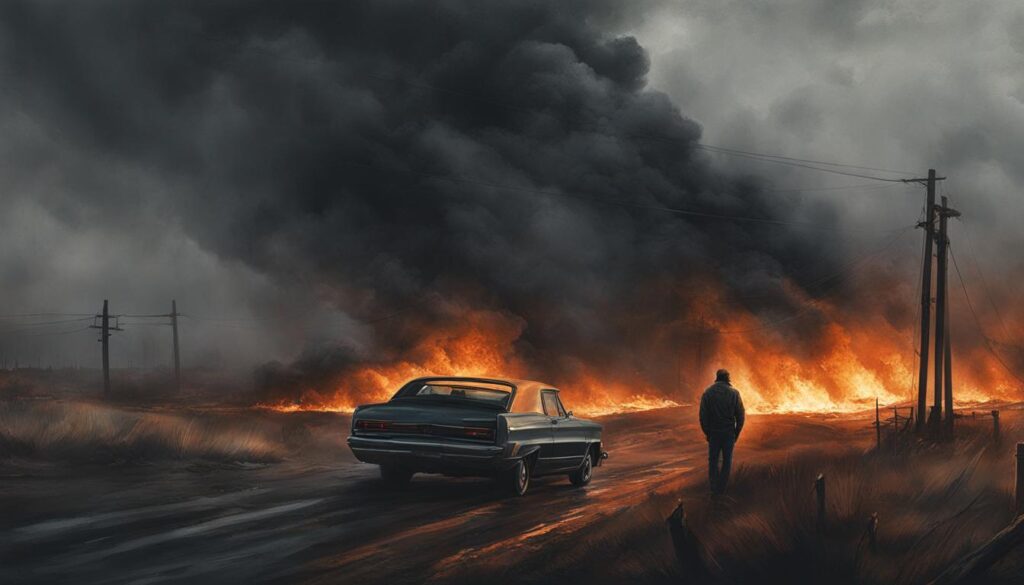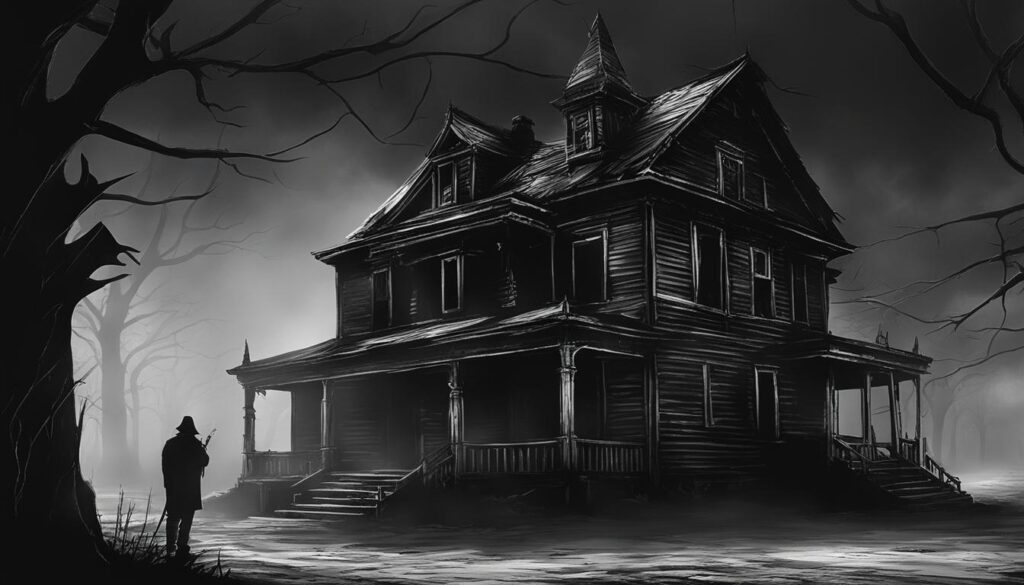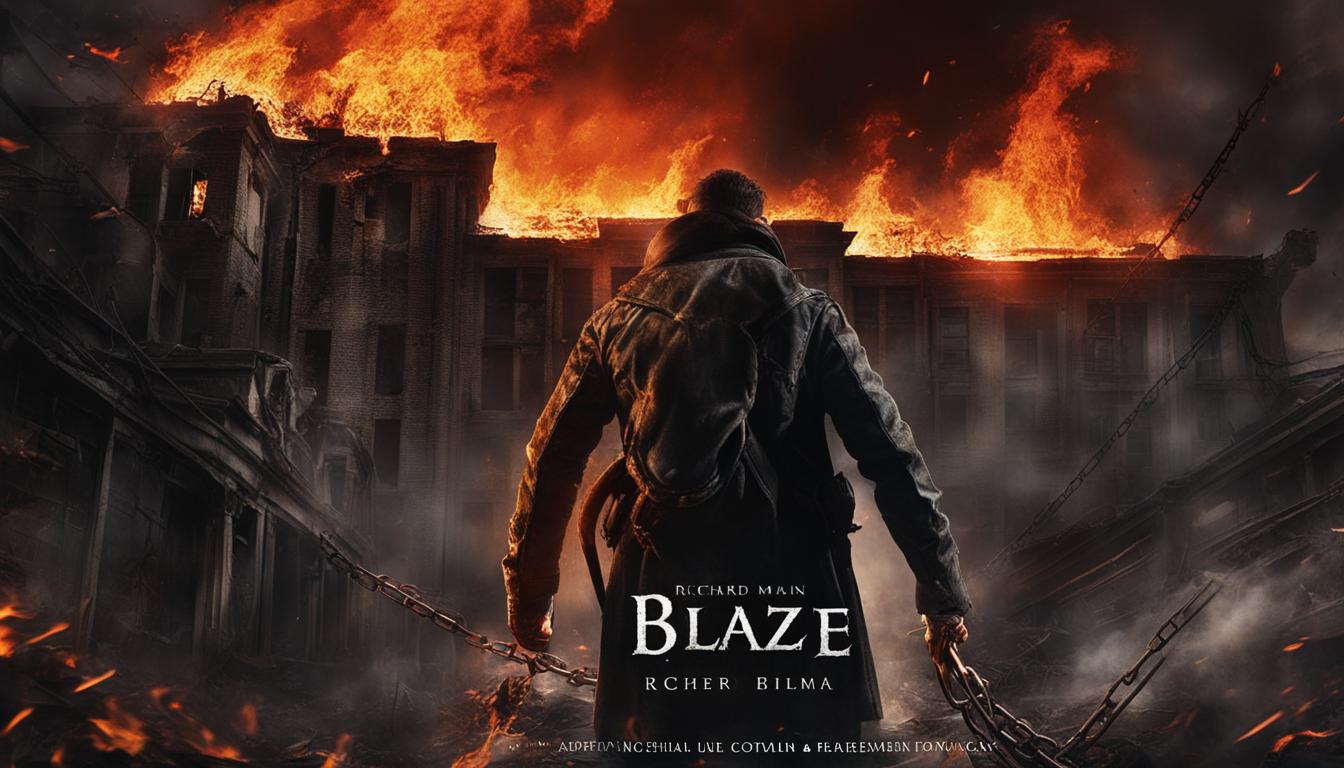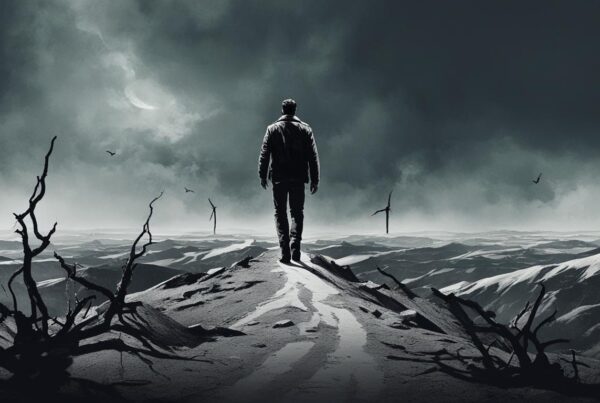The literary world was abuzz when it was revealed that Richard Bachman was, in fact, a pseudonym for the prolific master of horror, Stephen King. The Blaze audiobook, a gripping crime thriller, marks a fascinating entry in this canon. With this audiobook review, we delve into the depths of a narrative that showcases King’s versatility as it thrives under the guise of Bachman. “Blaze” presents listeners with an intricate and psychological portrayal of an antihero’s down-spiraling journey, offering a distinct experience from King’s typical oeuvres.
Published posthumously for Bachman, this novel captivates the audience through its audio rendition, where the power of voice breathes new life into King’s words, creating an immersive escapade that echoes in the ears and minds of its listeners long after the last word is spoken. Exploring both the dark corners of crime fiction and the introspective pathways of its characters, the “Blaze” audiobook deserves recognition as an artifact not only of its genre but of its creator’s hidden breadth of talent. Stay tuned as we unravel the layers behind this enigmatic release.
The Origins of “Blaze” and the Bachman Pseudonym
Delving into the alleys of literary history, one uncovers a compelling tale of authorial duality where Stephen King, a behemoth in the horror genre, donned the guise of Richard Bachman. This endeavor was not mere whim but a strategy laden with purpose, leading to the cultivation of an entirely distinct narrative voice. The Bachman pseudonym afforded King the latitude to explore different genres, resulting in ‘Blaze’—a tale unique from his customary horror repertoire.
Exploring Bachman’s Identity as Stephen King’s Alter Ego
The use of a pseudonym by renowned authors is a tale as old as time, but Stephen King’s invention of Richard Bachman has a history teeming with particular nuances and strategic intent. The decision to publish under a different name allowed King the freedom to experiment, unfettered by the colossal expectations attached to his name. The exploration into this dual identity uncovers the dichotomy between expectation and expression, providing a spellbinding narrative versatility that fans of King’s work fervently dissect.
Uncovering the History Behind “Blaze”
Initially withheld from publication, ‘Blaze’ was later released to the world under the Bachman title. Fans and critics alike were intrigued by the mystery shrouding its origin story, which, once unraveled, offered profound insights into King’s literary journey. The revelation of King as Bachman sent ripples through the literary world, prompting editorial reflections on the author’s adept storytelling abilities beyond the spectral bounds of horror.
‘Blaze’, when examined closely, slips seamlessly into the Bachman universe, yet stands as a testament to Stephen King’s narrative range. It is a provocative piece that balances between identities, revealing the deeper layers of King’s craftsmanship. Through a considered retrospect, one can unveil the strategic brilliance behind the Bachman front—a facade that allowed a beloved literary master to stretch the limits of his imagination and take his audiences along for the exhilarating journey.
| Year | Event | Significance |
|---|---|---|
| 1977 | Creation of Richard Bachman | King’s pseudonym revealed, emphasizing his ability to diversify beyond horror. |
| 1985 | Release of “Thinner” | King’s true identity as Bachman disclosed, leading to renewed interest in Bachman’s work. |
| 2007 | Posthumous release of ‘Blaze’ | Further exploration of King’s narrative prowess in crime fiction and the psychological thriller genre. |
Thus, the origin story of ‘Blaze’ and the Richard Bachman pseudonym intertwines with the indelible mark Stephen King has made on the literary world—an intertwining that will continue to fascinate and inspire both ardent followers and casual readers for generations to come.
Plot Synopsis of “Blaze”
Diving into Stephen King’s crime novel blueprint, “Blaze” is a narrative that examines the psyche of its main character, Clayton Blaisdell Jr., or ‘Blaze’, entangled in a criminal escapade underscored by emotional resonance and heart-stopping suspense. The storyline introduces Blaze, whose towering frame and mental faculties, dimmed by a traumatic childhood, position him as an idiosyncratic protagonist in a gripping kidnapping drama.
The Blaze plot unfolds with a scheme that is as desperate as it is ill-conceived. Blaze, tormented by his past and glaring deficiencies, is coaxed into abducting a baby heir to a rich family by his deceased criminal mentor’s lingering influence. This ill-starred plan spirals into an odyssey of unforeseen complications and moral dilemmas. Readers witness the layers of Blaze’s rugged exterior peel away, revealing disparate shards of humanity within him, despite his felonious path.
To vitalize the narrative’s backdrop, King crafts a vivid tapestry of side characters that interact with Blaze in unexpected ways, metamorphosing a simple criminal plot into a study of human connection and isolation. The consequences of Blaze’s actions, stemming from a concoction of vulnerability, innocence, and a fractured moral compass, captivate the reader’s empathy, and underpin the narrative’s core dilemma: is redemption conceivable for a man like Clayton Blaisdell Jr.?
| Aspect | Description |
|---|---|
| Protagonist | Clayton Blaisdell Jr. – Blaze |
| Central Event | Kidnapping of an infant heir |
| Intent | To secure a fortune via ransom |
| Conflict | Disturbed by memories and morality |
| Complications | Unanticipated connections and challenges |
| Outcome | A journey through pathos and redemption |
Encapsulating the essence of a Stephen King crime novel, “Blaze” straddles the chasm between psychological exploration and raw storytelling, embodying a composition that undulates between the harrowing and the humane. This kidnapping drama not only represents a deviation from King’s better-known horror domain but also an excavation into the darker lapses of the human condition, leaving the reader ruminating on the possible existence of hope in the direst corners of society.
Character Analysis of Clayton Blaisdell Jr.
The literary figure of Clayton Blaisdell Jr., frequently referred to as Blaze, stands tall as a complex character in modern fiction. Within the pages of Stephen King’s “Blaze,” penned under the pseudonym Richard Bachman, readers are presented with a multifaceted portrait of an antihero. Blaze’s actions and life history evoke a tumultuous blend of emotions, from deep sympathy to palpable revulsion, as one delves into the titular character’s analysis. This section peers into the intricate dynamics between Blaze and the cast of characters that influence his journey, ultimately enriching the narrative tapestry of King’s storytelling.
“Blaze” as an Antihero: Sympathy and Revulsion Mingled
Eminent in the realm of antiheroes in literature, Clayton Blaisdell’s existence is marred by tragedy and poor decisions, positioning him as a character to whom readers are drawn, yet from whom they also recoil. Blaze character study indicates that the antihero invites inquiry into the moral ambiguity that defines his life. His back story, replete with hardship, shapes not only his psyche but also the decisions leading to the novel’s pivotal moments.
Supporting Cast: The People Surrounding Blaze
The ensemble of characters encircling Blaze provides a rich soil from which his personality blooms. They are more than mere backdrops; they catalyze the evolution of Blaze’s narrative arc, each person leaving an indelible impact. Here, a detailed analysis unfolds, demonstrating how the supporting characters serve as a mirror to Blaze, reflecting his complexities and the depth of his human experience.
| Character | Relationship with Blaze | Impact on Blaze’s Journey |
|---|---|---|
| George Rackley | Partner in crime and mentor figure | Guides Blaze’s criminal endeavors, influencing his moral compass |
| Joe | Victim of kidnapping plot | Awakens latent paternal instincts in Blaze, complicating his criminal facade |
| John Cheltzman | Scheming accomplice | Fuels Blaze’s ambitions, leading to pivotal turning points in the plot |

Capturing the essence of Clayton Blaisdell analysis reveals a compelling, albeit troubled, individual whose life and choices encapsulate the timeless trope of the antihero. His story, as uncovered in “Blaze,” pierces through the archetype to showcase a deeply human character, subject to both the whims of fate and the consequences of his own actions, making him a resonant figure in the annals of fictional antiheroes.
Themes and Motifs in “Blaze”
The novel “Blaze” by Richard Bachman, an alias for Stephen King, entraps readers with its poignant exploration of profound literary themes and motifs. Central to the narrative’s heart are the constructs of fate and friendship, which interweave through the fabric of the crime novel, enriching the story with layers of meaning. Below, we unravel these themes and their impact on literature.
The Role of Fate and Circumstance
Fate looms large over the characters within “Blaze”, dictated by the unforeseen and often merciless events that define the human condition. Skillfully, Bachman delves into how external forces shape life trajectories, leaving protagonists grappling with the cards dealt by destiny. This age-old theme of literary relevance holds a mirror to the unpredictable nature of existence, emphasizing that the control one exerts is often just an illusion.
Friendship and Loneliness: The Emotional Undercurrents
Friendship and loneliness stand as dual forces, pushing and pulling on the strands of the characters’ emotional tapestries. “Blaze” presents these affective states with raw authenticity, examining their complex duality. The solace found in companionship juxtaposes with the desolation of isolation, offering insights into the actions and motivations that drive individuals to the edges of morality and beyond in crime novels.
The rhythmic recurrence of these themes not only captivates the reader but elicits profound thought on the intrinsic motifs prevalent in crime fiction. The motifs of the narrative are like ciphers, encoding deeper meanings that reflect both the personal and societal planes.
The dissection and study of these literary themes in “Blaze” contribute to a broader understanding of how classical narratives are being contemporized in today’s literary circles, reinforcing the timeless nature of such thematic explorations in the realm of fate and friendship in literature.
Stephen King’s Writing Style as Richard Bachman
Exploring the nuanced elements that define Stephen King’s writing style when he dons the guise of Richard Bachman, a reader can observe the stark contrasts and surprising similarities that dominate his works. In the Bachman narrative technique, there’s a propensity for a gritty, more grounded take on storytelling, often diverging from King’s typical oeuvre marked by supernatural horror. Yet, King’s signature psychological depth does not vanish; it subtly morphs, especially within the pages of the psychological crime fiction novel “Blaze”.
Bachman Vs. King: At a glance, King’s Bachman alter ego seems like a straightforward pseudonym designed for genre exploration. However, on a deeper level, King’s metamorphosis into Bachman reveals an experimentation with a more direct, sometimes harsh narrative style. It’s an intriguing exercise in authorial adaptability that proves King’s mastery over diverse literary terrains.
In a detailed analysis, critical essays accentuate the Bachman narrative technique as it is laced with a more pronounced focus on societal issues, a feature often less intense in King’s traditional narratives. The roots of this approach take form in a slightly more stark and barebones narrative, perhaps reflecting Bachman’s supposed ‘blue-collar’ background versus King’s ‘literary acclaim’.
King’s conversations, particularly on his writing process for Bachman titles, shine a light on the intentional distinctions crafted between King’s horror-centric domain and Bachman’s unsettling dive into realism. This complex narrative duel encapsulates the psychological intricacies that King, regardless of the name on the cover, weaves into his protagonists – they’re often flawed, deeply human, and embroiled in internal conflict.
Forum aficionados often debate the nuances that set apart a Bachman book from a King novel, but it’s the psychological underpinnings, the careful exploration of the human psyche amid dire straits, that emerge as a common thread in reader discussions. Even under the guise of Bachman, King doesn’t desert his proclivity for delving into the minds of his characters, making “Blaze” a resonant example of psychological crime fiction with an undeniable King flavor.
| Aspect | Stephen King Style | Bachman Technique |
|---|---|---|
| Genre Predilection | Horror and Supernatural | Crime and Realism |
| Tone | Lyrical and Atmospheric | Direct and No-nonsense |
| Themes | Good vs. Evil, Redemption | Societal issues, Identity |
| Character Focus | Well-rounded, often with supernatural abilities or encounters | Complex psyches, emotionally raw, firmly grounded in reality |
The synthesis of King’s and Bachman’s writing styles in “Blaze” fosters a unique literary experience. It’s here in the gritty confrontation of crime and the psychological exploration of a flawed human being that King’s talent for storytelling, regardless of pseudonym, truly shines.
Comparison to Stephen King’s Other Works
Delving into the literary enigma that is Stephen King vs. Richard Bachman begs an analysis beyond mere surface-level scrutiny. The synthesis of thematic choices and narrative styles has often spurred a fascinating debate concerning the authorial voice that permeates the works of King and his alter ego, Bachman. While the horror maestro’s touch remains evident, the divergence that arises in tales penned under the pseudonym presents a literary comparison waiting to be unraveled.
Similarities with King’s Signature Style
The skeletal structure of King’s authorial voice is visible in the flesh of Bachman’s narratives. Upon inspecting “Blaze,” certain fingerprints seem unmistakably King – a methodical build-up of suspense, deeply flawed yet intricately crafted characters, and a narrative rhythm that captivates the reader’s senses. These stylistic hallmarks echo themes King has explored throughout his bibliography, such as the human psyche’s fragility and the often unclear boundaries between good and evil.

Distinguishing Bachman’s Unique Voice
The authorial voice of Richard Bachman resonates with a distinct pitch, cadence, and timbre. In the annals of this literary comparison, Bachman emerges as the more stark, stripped-down counterpart to King’s baroque horror. Where the supernatural often invades King’s narratives, Bachman’s world is firmly grounded in the natural, albeit darker sides of reality, and “Blaze” stands as a testament to this dichotomy. The story unfolds a crime drama that, while absent the ghouls and sinister forces, delves deep into the psyche of a man driven to desperate measures.
Through empirical research and fan discourse, it becomes clear: “Blaze” is a bridging of worlds between Stephen King’s inherent complexity and Richard Bachman’s more direct, often brutally honest storytelling. The debate surrounding Stephen King vs. Richard Bachman not only enriches the understanding of King’s literary prowess but affords Bachman an independent space in the pantheon of great American writers.
The Audiobook Experience of “Blaze”
The transition of Stephen King’s “Blaze” from the page to audio brings a new dimension to the gripping crime thriller, engaging listeners in a profound way. The dynamic interplay of audiobook narration and audio storytelling elevates the Blaze audiobook experience, providing a sensory journey into the heart of the narrative.
Narrator’s Performance: Bringing Blaze to Life
The delivery and personification of Clayton Blaisdell Jr. by the narrator are crucial, as the narrator’s skillful voice modulation and emotional portrayal contribute to a multifaceted character that resonates with listeners. The character’s inner turmoil and the novel’s suspenseful arc are vividly brought to life through an impactful performance, drawing listeners deeper into the twisting plot.
The Impact of Audio on the Storytelling
Audio format offers an immersive experience that invites imagination to play its part. It can enhance the mood and intensity of scenes, transporting listeners to the shadowy world King has crafted. Analyzing reviews and professional assessments, it’s evident that audio storytelling can augment the story’s reach and impact, changing the way we absorb and interpret the narrative threads woven throughout “Blaze”.
“Blaze” in the Context of Crime Fiction
In analyzing Stephen King’s foray into the crime fiction genre through “Blaze,” it is evident that the novel embodies many of the hallmarks, yet also diverges with unique inflections that mark the tale as a distinctive piece within the genre. The diligently structured Blaze genre analysis affords an opportunity to unravel King’s enigmatic inclusion in the crime fiction landscape under his pseudonym, Richard Bachman.
Central to a conventional crime narrative is the opposition between societal order and the chaos of criminal activity. Through Blaze, King threads a complex character study into this milieu, using a protagonist cast as both victim and transgressor. This duality sets “Blaze” apart, merging King’s keen eye for psychological depth with the robust plot-driven essence of crime storytelling.
“Blaze challenges and reinvents the tropes of the crime fiction genre, pushing readers to question their own values in the face of moral ambiguity.”
The genre conventions followed and subverted by “Blaze” go beyond the boundaries of simple categorization. Stephen King in crime fiction brings to the table a nuanced perspective, blending the genre’s expectations with his trademark ability to delve into the fringes of his characters’ psyches. With this mixture, “Blaze” occupies a liminal space within the genre, at once familiar and unorthodox.
To better understand “Blaze’s” standing, a comparison with recognized benchmarks in the genre proves invaluable:
| Aspect | “Blaze” by Richard Bachman | Traditional Crime Fiction |
|---|---|---|
| Protagonist | Complex antihero, evoking sympathy | Often a morally upright detective or agent |
| Plot | A character-driven kidnapping plot | Usually focused on crime-solving |
| Psychological Elements | Highly emphasized, shaping the narrative | Present but secondary to the plot |
| Resolution | Leaves readers contemplating moral complexities | Typically resolves with restoration of order |
This exploration reveals King’s adept crafting of stories that are not confined to genre specifications but instead expand them. “Blaze” doesn’t just reside within the safe boundaries of the crime fiction genre, it stretches those boundaries, much as King has stretched horror, fantasy, and supernatural thriller genres elsewhere in his work.
Critical Reception and Reviews of “Blaze”
The unveiling of “Blaze” under the pen name Richard Bachman invited a unique cluster of Blaze book reviews that hinged on both critical analysis and the consumer’s lens. Many reviews from literary aficionados and publications highlighted the enthralling storyline and the dark complexities of Stephen King’s narrative as penned by Richard Bachman. Critics applauded the psychological depth and crime thriller pacing that kept readers vested in the fate of Clayton Blaisdell Jr. Yet, the reception was not without its complexities, including debates over King’s departure from his shadowed alcoves of horror into the stark lights of crime fiction.
Over time, the public’s view of “Blaze” shifted, riding the waves of King’s ever-growing reputation. The initial intrigue that surrounded the novel’s release – enveloped in the mystery of Bachman’s true identity – gave way to a more nuanced appreciation of the work. The Stephen King novel reception typically brings certain expectations, and some readers found themselves in uncharted waters with “Blaze.” Critical opinion recognized “Blaze” as a notable detour from King’s traditional realm of horror, offering fresh discourse on his capabilities as a versatile author within the crime genre.
The retrospective scrutiny from book critics and Stephen King connoisseurs enriched the narrative with varied perspectives and interpretations, adding layers to the book’s standing in literary circles. As reviews emerged from platforms like Goodreads and Amazon, the collective voice of readers echoed a sentiment of respect for King’s craft, even when masked behind another name. The intricate balance between authorial notoriety and literary merit cements “Blaze” as a distinct piece in King’s bibliography – a topic best left to each reader to explore and conclude.



